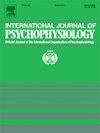Effects of total sleep deprivation on functional connectivity of the anterior cingulate cortex: Insights from resting-state fMRI in healthy adult males
IF 2.5
3区 心理学
Q3 NEUROSCIENCES
引用次数: 0
Abstract
Inadequate sleep significantly impacts an individual's health by compromising inhibitory control and self-regulation abilities. This study employed resting-state functional magnetic resonance imaging (fMRI) to assess the functional connectivity between the anterior cingulate cortex (ACC) and the whole brain in 16 healthy adult males after 36 h of total sleep deprivation. Additionally, this study investigated alterations in individuals' inhibitory control functions and physiological mechanisms following sleep deprivation. The results showed a significant increase in functional connectivity between the ACC, the left angular gyrus, and the right hippocampus following 36 h of continuous sleep deprivation. Conversely, functional connectivity was notably decreased between the ACC and the right insular cortex, right paracingulate gyrus, and bilateral putamen. Furthermore, changes in ACC functional connectivity were significantly correlated with alterations in behavioral performance in the go/no-go task after sleep deprivation. This study contributes to understanding brain network mechanisms in the anterior cingulate gyrus after sleep deprivation. It clarifies the relationship between functional connectivity changes in the anterior cingulate gyrus and inhibitory control post-sleep deprivation.
完全剥夺睡眠对前扣带回皮层功能连接的影响:对健康成年男性静息态 fMRI 的启示。
睡眠不足会损害抑制控制和自我调节能力,从而严重影响个人健康。本研究利用静息态功能磁共振成像(fMRI)评估了16名健康成年男性在完全剥夺睡眠36小时后前扣带回皮层(ACC)与整个大脑之间的功能连接。此外,这项研究还调查了睡眠剥夺后个体抑制控制功能和生理机制的改变。结果表明,在连续剥夺睡眠 36 小时后,ACC、左侧角回和右侧海马之间的功能连接性明显增强。相反,ACC与右侧岛叶皮层、右侧扣带回和双侧普坦之间的功能连接则明显减少。此外,ACC功能连接的变化与睡眠剥夺后 "走/不走 "任务中行为表现的改变有显著相关性。这项研究有助于了解剥夺睡眠后扣带回前部的大脑网络机制。它阐明了扣带前回的功能连接变化与睡眠剥夺后抑制控制之间的关系。
本文章由计算机程序翻译,如有差异,请以英文原文为准。
求助全文
约1分钟内获得全文
求助全文
来源期刊
CiteScore
5.40
自引率
10.00%
发文量
177
审稿时长
3-8 weeks
期刊介绍:
The International Journal of Psychophysiology is the official journal of the International Organization of Psychophysiology, and provides a respected forum for the publication of high quality original contributions on all aspects of psychophysiology. The journal is interdisciplinary and aims to integrate the neurosciences and behavioral sciences. Empirical, theoretical, and review articles are encouraged in the following areas:
• Cerebral psychophysiology: including functional brain mapping and neuroimaging with Event-Related Potentials (ERPs), Positron Emission Tomography (PET), Functional Magnetic Resonance Imaging (fMRI) and Electroencephalographic studies.
• Autonomic functions: including bilateral electrodermal activity, pupillometry and blood volume changes.
• Cardiovascular Psychophysiology:including studies of blood pressure, cardiac functioning and respiration.
• Somatic psychophysiology: including muscle activity, eye movements and eye blinks.

 求助内容:
求助内容: 应助结果提醒方式:
应助结果提醒方式:


